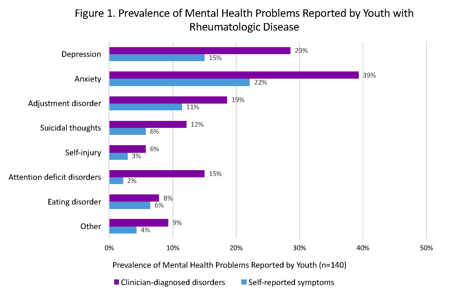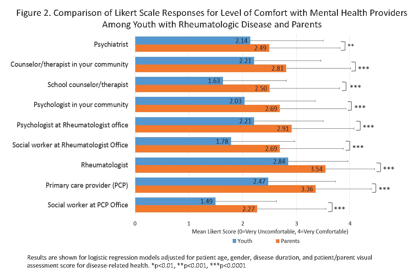Session Information
Date: Monday, October 22, 2018
Session Type: ACR Poster Session B
Session Time: 9:00AM-11:00AM
Background/Purpose: Mental health conditions are common in youth with rheumatologic disease, yet intervention strategies are understudied. We used a patient-engaged approach to investigate the mental health needs of youth with rheumatologic disease.
Methods: An anonymous online survey examined beliefs and experiences with mental health for youth with rheumatologic disease. Eligible youth ages 14-24 years had a diagnosis of juvenile arthritis, juvenile dermatomyositis, or systemic lupus erythematosus, and reported specific treatment for the condition. Parents of youth 8-24 years meeting the above criteria were also eligible to participate. The survey was developed in collaboration with patient and parent advisors, the Childhood Arthritis & Rheumatology Research Alliance (CARRA), and the Patients, Advocates, and Rheumatology Teams Network for Research and Service (PARTNERS). Participants were recruited through the Arthritis Foundation, Lupus Foundation of America, and Cure JM Foundation. We compared youth and parent responses using regression models (adjusted for demographic and disease covariates) to examine: 1) reported prevalence of mental health problems, categorized into mutually exclusive clinician-diagnosed disorders and self-reported symptoms, 2) mean Likert ratings (0=low, 4=high) for the impact of disease aspects on mental health, and 3) comfort level with potential mental health providers.
Results: 485 respondents included 140 patients (29%) and 345 (71%) parents. Clinician-diagnosed anxiety was reported by 39% of youth, depression by 29%, and adjustment disorders by 19% (Figure 1); another 22%, 15% and 11% had self-reported symptoms of these disorders, respectively. Mean Likert ratings by youth indicated that disease aspects most impacting mental health were physical limitation at 2.7 (SD 1.1), taking medications at 2.6 (1.2), and dealing with disease flares at 2.5 (1.2). Adjusted models showed no difference between youth and parents for reported mental health problems or impacting factors. Youth were significantly less comfortable interacting with all potential mental health providers than parents, particularly social workers and school counselors (Figure 2); both groups felt most comfortable with rheumatologists and primary care providers.
Conclusion: Youth with rheumatologic disease have high rates of diagnosed and undiagnosed mental health problems, which are impacted by their disease. Mental health intervention in primary care and subspecialty care settings may improve mental health education, screening and treatment for these youth.
To cite this abstract in AMA style:
Fawole O, Vickery M, Faust L, Rubinstein T, Harris J, Hersh AO, Onel K, Lawson E, von Scheven E, Ardalan K, Morgan E, Paul A, Barlin J, Daly RP, Dave M, Malloy S, Hume S, Schrandt S, Marrow LC, Chapson A, Napoli D, Napoli M, Moyer M, Adamski R, Del Gaizo V, Rodriguez M, Knight AM. Engaging Patients and Parents to Improve Mental Health for Youth with Rheumatologic Disease [abstract]. Arthritis Rheumatol. 2018; 70 (suppl 9). https://acrabstracts.org/abstract/engaging-patients-and-parents-to-improve-mental-health-for-youth-with-rheumatologic-disease/. Accessed .« Back to 2018 ACR/ARHP Annual Meeting
ACR Meeting Abstracts - https://acrabstracts.org/abstract/engaging-patients-and-parents-to-improve-mental-health-for-youth-with-rheumatologic-disease/


